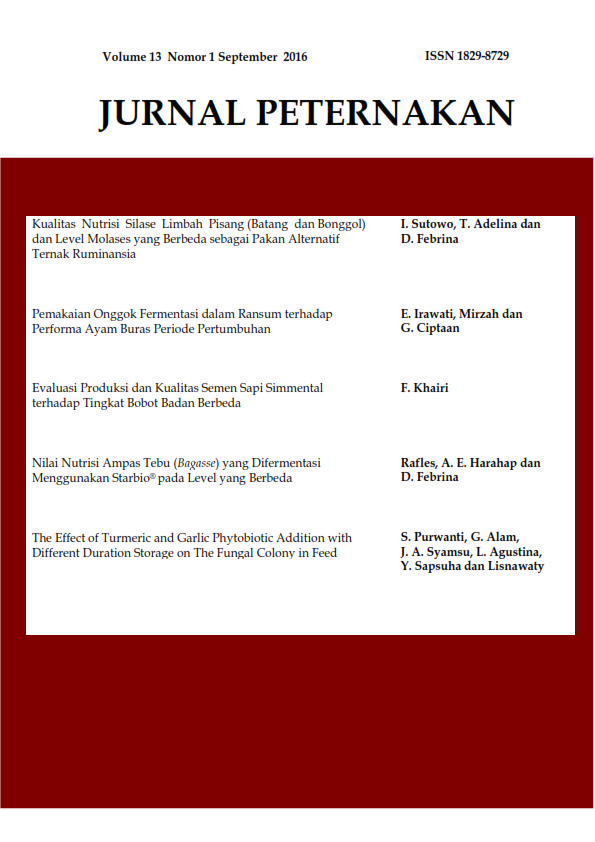NILAI NUTRISI AMPAS TEBU (Bagasse) YANG DIFERMENTASI MENGGUNAKAN STARBIO® PADA LEVEL YANG BERBEDA
DOI:
https://doi.org/10.24014/jupet.v13i2.2420Keywords:
sugarcane, by product, probioticAbstract
The bagasse has potential as an alternative feed for ruminant. However, though the high of the crude fibre and the very low in the nutritional value make them very limited in using for animal feed. To overcome the problem in order to increase nutritional value was the fermentation technology by the application of the starbio inoculums. The objective of the research was to observe the nutrition qualities of the bagasse with aplication of different levels of starbio. The experimental design was a completely Randomized Design with 4 treatments i.e. P0 (bagasse + 0% Starbio), P1 (bagasse+ 0.2% starbio), P2 (bagasse+ 0.4% Starbio), P3 (bagasse+ 0.6% Starbio) and each treatment has 5 replication, The parameters measured were pH, dry matter (DM), crude protein (CP), ether extract (EE) crude fiber (CF), ash and Nitrogen Free Extract (NFE). The results of the research indicated that pH of the fermentation was very good (3.37-3.67), DM (66.59-68.73%), and CP 1.47-1,97%. However, there was no effect on EE, CF, ashes and NFE. The addition of 0.6% starbio was the best result to increase CP but did not affect on ash content.
Downloads
Published
Issue
Section
License
The Authors submitting a manuscript do so on the understanding that if accepted for publication, copyright of the article shall be assigned to Jurnal Peternakan and published by Fakultas Pertanian dan Peternakan Universitas Islam Negeri Sultan Syarif Kasim Riau as publisher of the journal.
Authors who publish with this journal agree to the following terms:
Authors automatically transfer the copyright to the journal and grant the journal right of first publication with the work simultaneously licensed under a Creative Commons (CC BY) that allows others to share the work with an acknowledgement of the work's authorship and initial publication in this journal.
Authors are able to enter into separate permission for non-exclusive distribution of the journal's published version of the work (e.g., post it to an institutional repository or publish it in a book), with an acknowledgement of its initial publication in this journal.
Authors are permitted and encouraged to post their work online (e.g., in institutional repositories or on their website) prior to and during the submission process, as it can lead to productive exchanges, as well as earlier and greater citation of published work (See The Effect of Open Access).

